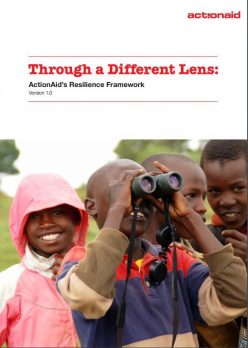Through a Different Lens: ActionAid’s Resilience Framework
Over the past few decades, it has become increasingly clear that conflicts and disastersare affecting the poorest and most vulnerable people in greatest numbers. They often face a complex array of threats, which need to be addressed by taking a holistic view and considering problems and their answers in relation to each other.
Resilience building offers a response to these increasingly complex realities. It widens the focus to include shocks and stresses such as natural resource degradation, epidemics, political oppression, violent conflict or economic crises. It promotes a rounded analysis of the issues, together with an integrated approach to
dealing with them that includes and goes beyond the more conventional disaster risk reduction and climate change adaptation approaches.
